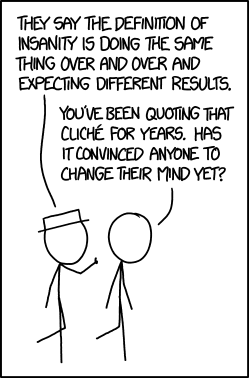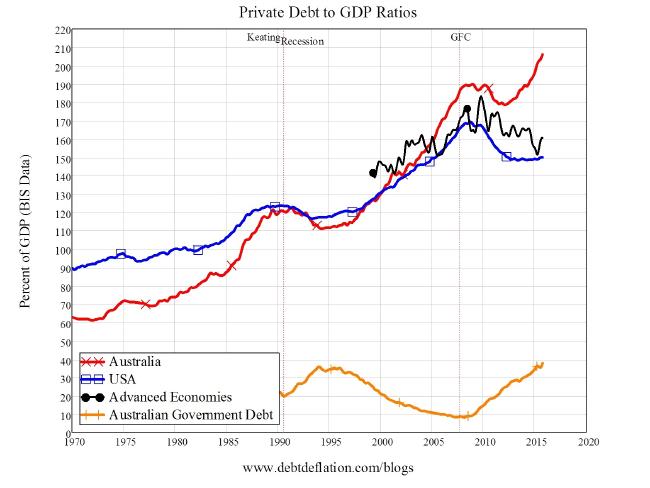Sunday, 10 July 2016 - 4:07pm
This week, I have been mostly reading:
- Psychologists Throw Open The “File Drawer” — Neuroskeptic:
Now, a group of Belgian psychology researchers have decided to make a stand. In a bold move against publication bias, they’ve thrown open their own file drawer. In the new paper, Anthony Lane and colleagues from the Université catholique de Louvain say that they’ve realized that over the years, “our publication portfolio has become less and less representative of our actual findings”. Therefore, they “decided to get these [unpublished] studies out of our drawer and encourage other laboratories to do the same.”
- Insanity — xkcd:

- Reform School — Malcolm Harris at The New Inquiry reviews Schools on Trial, by Nikhil Goyal:
In 1837, Horace Mann, the founder of American compulsory education, established the Massachusetts Board of Education, the first such agency and one which would become the model for the nation. But Mann didn’t want a more intellectually engaged population—literacy in the state already stood at 99 percent. Social control was a serious concern for Western elites after a series of failed revolutions, and Mann was very impressed by the system he saw on a visit to Prussia. He returned with a plan for public education. “Compulsory schooling evangelists,” Goyal writes, “which included many industrialists and financiers, in fact, wanted to ‘dumb down’ the American population to create docile followers, not potentially troublesome freethinkers who questioned authority.”
- Trade Treaty Propaganda Goes Into High Gear — Dean Baker, CEPR:
As far as the protectionism in the TPP, the deal is quite explicitly about increasing the length and strength of patent and copyright protection. Yes, that is "protection" as in "protectionism." Patent and copyright protection do serve a purpose in providing an incentive for innovation and creative work, but all forms of protection serve a purpose. The question that serious people ask is whether there is a better way to serve the purpose.
- 'I Love My Label': Resisting the Pre-Packaged Sound in Ed-Tech — Audrey Watters:
As someone who works outside of academia, without an institutional affiliation, I can’t begin to tell you how frustrating it is to be unable to access journal articles. I always get so irked when I hear technology evangelists proclaim “You can learn anything you want on the Internet.” No, you can’t. Huge swaths of knowledge, art, science remain inaccessible; and it’s a loss for scholarship, which need not and does not only happen among those with access to a university research library or with log-in credentials to its online portal. That inaccessibility is a reflection of institutional culture, industry culture, corporate culture, copyright (that is, intellectual property laws), capitalism, and code. That is, when we talk about the future of something like “education technology” or even when we talk about the future of research and scholarship or teaching and learning, we must grapple with issues that are technological, sociological, and above all, ideological.
- The elites hate Momentum and the Corbynites - and I’ll tell you why — David Graeber, providing "opinion" for The Guardian, as opposed to whatever the hell you'd call the utter tripe they normally publish about Corbyn:
I’ve spent much of the past two decades working in movements aimed at creating new forms of bottom-up democracy, from the Global Justice Movement to Occupy Wall Street. It was our strong conviction that real, direct democracy, could never be created inside the structures of government. One had to open up a space outside. The Corbynistas are trying to prove us wrong. Will they be successful? I have absolutely no idea. But I cannot help find it a fascinating historical experiment. […] insofar as politics is a game of personalities, of scandals, foibles and acts of “leadership”, political journalists are not just the referees – in a real sense they are the field on which the game is played. Democratisation would turn them into reporters once again, in much the same way as it would turn politicians into representatives. In either case, it would mark a dramatic decline in personal power and influence. It would mark an equally dramatic rise in power for unions, constituent councils, and local activists – the very people who have rallied to Corbyn’s support.
- The Duncan Smith resignation: fundamentally shifting the economic debate — Neil Schofield:
'I am unable to watch passively whilst certain policies are enacted in order to meet the fiscal self imposed restraints that I believe are more and more perceived as distinctly political rather than in the national economic interest.' In other words, for the first time a key player in the post-2010 Conservative project has said, almost explicitly, that austerity is a political, not an economic choice. […] In other words, Duncan Smith’s resignation letter – and the events surrounding it – powerfully endorse the fundamental tenet of Jeremy Corbyn’s and John McDonnell’s economic programme: that austerity is a choice, not an economic necessity. It wholly destroys the intellectual underpinning of McDonnell’s opponents in the Parliamentary Labour Party.
- Peak Indifference — Cory Doctorow in Locus Online:
At a certain point, indifference to tobacco’s dangers peaked – long before actual tobacco use peaked. Peak indifference marks a turning point. […] That’s why it’s time for privacy activists to start thinking of new tactics. We are past peak indifference to online surveillance: that means that there will never be a moment after today in which fewer people are alarmed by the costs of surveillance.
- A world war has begun. Break the silence. — John Pilger:
In 2009, President Obama stood before an adoring crowd in the centre of Prague, in the heart of Europe. He pledged himself to make "the world free from nuclear weapons". People cheered and some cried. A torrent of platitudes flowed from the media. Obama was subsequently awarded the Nobel Peace Prize. It was all fake. He was lying. The Obama administration has built more nuclear weapons, more nuclear warheads, more nuclear delivery systems, more nuclear factories. Nuclear warhead spending alone rose higher under Obama than under any American president.
- Budget accounting tricks — Simon Wren-Lewis:
One of the problems with fixed date deficit (or in this case surplus) targets is that they encourage playing around with the public finances to hit the target. Generally, but not always, this involves making a saving today by shifting costs into the future. Privatisation is an obvious example. It may be justified if the net present value of the sale is positive, or if privatisation really improves efficiency, but all to [sic] often it is a device to meet a short term target.
Although a New Keynesian (Wren-Lewis will when pressed admit he subscribes to the superstition of "sound finance"), he makes a good point here. i.e. that, just as in the popular bugaboo where public deficits can be run up by unscrupulous pollies who "buy votes", those same unscrupulous pollies are more likely in the current neoliberal environment to buy a reputation as good economic managers by using fire sales of public assets (usually a bad thing) to hide deficits (rarely a bad thing). - Get ready for a recession by 2017 — Steve Keen in the Australian:
Whichever party is in opposition at the time will blame the incumbent, but in reality this recession has been set up by the sidestep both parties have used to avoid downturns for the past quarter century: whenever a crisis has loomed, they’ve avoided recession by encouraging the private sector to borrow and spend. […] Australia’s most famous recession sidestep was during the GFC, when it was one of only two countries in the OECD to avoid experiencing two consecutive quarters of negative GDP growth (the other country was South Korea). Since then, the private sectors of the advanced countries have collectively de-levered, reducing their debt levels from about 170 to 160 per cent of GDP. Australia, in stark contrast, has levered up.

- Tony Blair's spin unspun: how his claims compare with the Chilcot report — Andy McSmith, The Independent:
Mr Blair has claimed that he was promising the Americans his support as a way of influencing Washington’s decision making and getting them to seek United Nations approval before acting. Taking questions from journalists, he asserted that his support was not “unconditional”. But the opening words of that July note [to Bush] – “I will be with you, whatever” – do sound unconditional.
- I read the Chilcot report as I travelled across Syria this week and saw for myself what Blair's actions caused — Robert Fisk, The Independent:
When Blair can say, as he did the moment the Chilcot report was published, that it should “lay to rest allegations [sic] of bad faith, lies and deceit” – without a revolution in the streets against his bad faith, lies and deceit – then you can be sure that his successors will have no hesitation in swindling the public again and again. After all, what’s the difference between Iraqi WMDs that don’t exist, 45-minute warnings that are falsities, 70,000 non-existent Syrian “moderates” and a fictitious NHS windfall of millions if Britain left the European Union?
- To Save The Economy, We Have To Break Its One Sacred Rule — Jason Hickel, Co.Exist:
As soon as we start focusing on GDP growth, we’re not only promoting the things that GDP measures, we’re promoting the indefinite increase of those things. And that’s exactly what we started to do in the 1960s. GDP was adopted during the Cold War for the sake of adjudicating the grand pissing match between the West and the USSR. Suddenly, politicians on both sides became feverish about promoting GDP growth. GDP growth became a sacred rule. And we remain in thrall to it today.
- Mocked and forgotten: who will speak for the American white working class? — Chris Arnade in The Guardian:
America, and particularly the white working class, is dealing with a drug epidemic that is killing more people each year at a startling rate. Just in the past decade deaths from drugs has doubled. The National Review sees it as another sign of the flawed character of the poor. This is a common and moralistic trope those battling an addiction have long dealt with – that it is all the fault of their weakness. The reality is often far more complex. Addiction thrives in societies undergoing stress.
- Stopping Deflation? Dead Easy. So Why Isn’t It Being Done? — Ian Welsh:
If you let fixed costs have inflation above income increases, then everything else is going to have to suffer deflation, because it is discretionary. Gotta eat and have a warm place to sleep, first.
- The Tory leadership election is a sort of X Factor for choosing the antichrist — Frankie Boyle in the otherwise disgraceful, paper of choice for the discerning New Labour war criminal, The Guardian:
[The Parliamentary Labour Party] say they need a leader who knows how to oppose, albeit primarily their own party membership. The idea is that Corbyn is unelectable, and it’s just one of life’s sad ironies that none of the people who believe this will be able to beat him in an election. […] One of the PLP’s main worries will be that Labour’s vote will crumble to Ukip under Corbyn, who won’t produce enough racist mugs and mouse mats to reassure everybody. And, to be fair, it must be galling to a party that invaded Iraq, rendered Libyans to be tortured by Gaddafi and detained asylum seekers with Dickensian cruelty to lose voters on the race issue.
